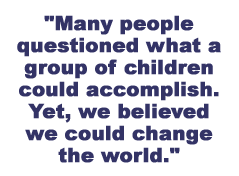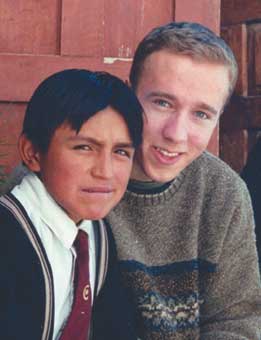"I WISH I COULD GO TO SCHOOL"
Kids Can Free the Children works to make the dream of education a reality for children around the world
By Craig Kielburger
May 2002
Return to Table of Contents
Print Article
He was sitting in the middle of a garbage dump in Manila searching through rotten food and medical waste for pieces of plastic he could salvage and sell to help his family survive. His name was Jeffrey and he was no more than 10 years old.
"Have you ever left the garbage dump, Jeffery?" I asked. He shook his head, No. "Do you think you will leave this place one day?" I continued. "No," he responded, looking up at me with his dark piercing eyes. "What do you wish for, Jeffrey?" "I wish I could go to school," he said.
Jeffrey is only one of the 125 million children in the world today who are denied the opportunity to go to school and receive a chance for a better life. Two thirds of these children are girls.
 The Catholic faith calls on all people rich and poor, young and old, to work to eliminate poverty, to speak out against injustice, and to help create a more caring society and peaceful world. I believe that young people, in particular, have a special responsibility to help improve the lives of their peers in the global community.
The Catholic faith calls on all people rich and poor, young and old, to work to eliminate poverty, to speak out against injustice, and to help create a more caring society and peaceful world. I believe that young people, in particular, have a special responsibility to help improve the lives of their peers in the global community.
I started the organization, Kids Can Free the Children [www.freethechildren.com] with a group of friends six years ago when I was 12 years old. Many people questioned what a group of children could accomplish. Yet, we believed that we could change the world. We believed that we had to at least try.
We soon discovered that education is one of the most effective ways to end poverty, to improve people's lives and to build a better and more just society.
As Kofi Annan, Secretary General of the United Nations, has stated, "On the foundation of education rest the cornerstones of freedom, democracy and sustainable human development."
We rallied youth around the world to speak out for the rights of children to go to school. And we challenged them to share. Young people responded by giving their birthday money, by organizing garage sales and school fundraisers. School councils adopted a program to build and to take care of a partner school in the developing world.
Over the past six years, mainly through the commitment of young people, we have been able to complete 225 schools in the developing world with many more under construction.
Seeing the need for children to have school supplies, we challenged young people to put together school and health kits. More than 100,000 of these kits have been shipped to poor children to help them go to school.

Craig Kielburger with Justo, whose life changed when a new school was built in his rural community in Ecuador
I recently traveled to Ecuador where we built a number of schools with partners we found through Scarboro Missions. It was there I met Justo Pacheco who told me how his life had changed because young people in North America had built a school in his community.
Justo was just eight years old when his father passed away. A poor indigenous boy, there was little hope for him to receive an education and break from the cycle of poverty.
With the help of young people in Kids Can Free the Children, a primary school was constructed in Pulingui, San Pablo. Justo was one of the first students to graduate. Now in high school, Justo is often spotted sitting under a tree doing his homework while he tends the sheep. He dreams of being a lawyer one day and fighting for free education for all children in Ecuador.
As Christians we are challenged to examine our values and the choices we make every day.
Today, the US spends $8 billion a year on cosmetics. Europe spends $105 billion each year on alcoholic drinks and $435 billion is spent globally each year on advertising.
To provide every child in the world with primary education would cost an extra $8 billion, the same as four days of global military spending.
Catholic teaching proclaims that the moral test of a society is how it treats its most vulnerable members including the poor and children.
As young people we must believe that we can change the world and help children grow up in dignity and hope for a better life. The challenge is ours.
Return to Table of Contents
Print Article